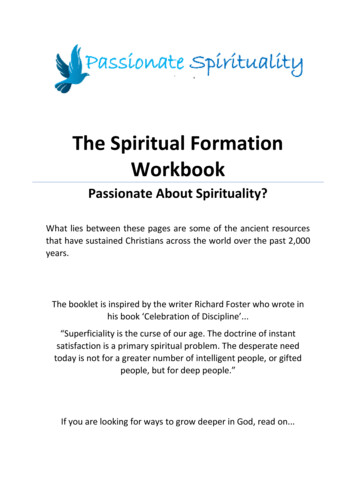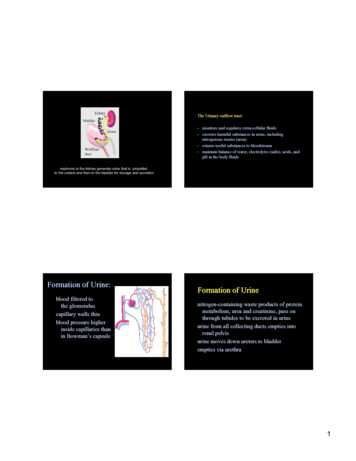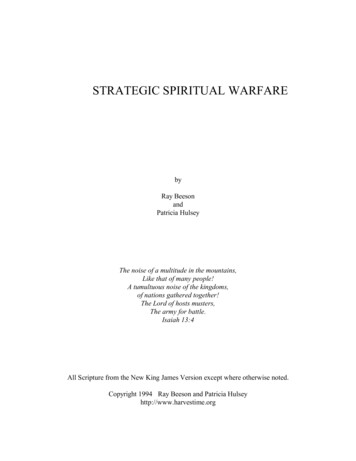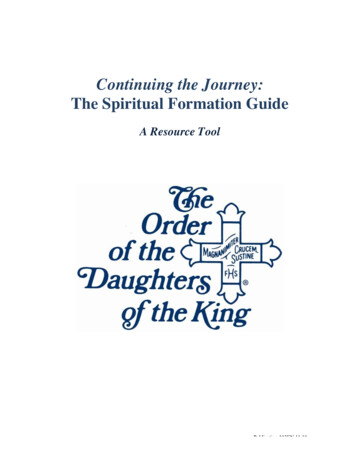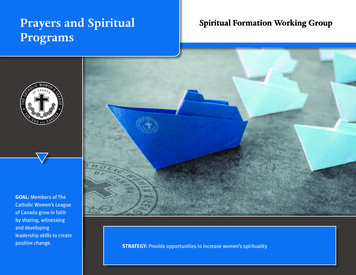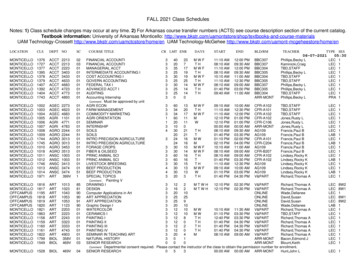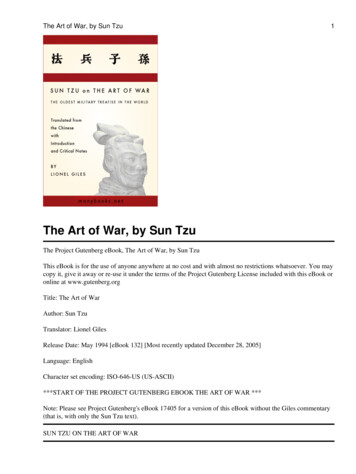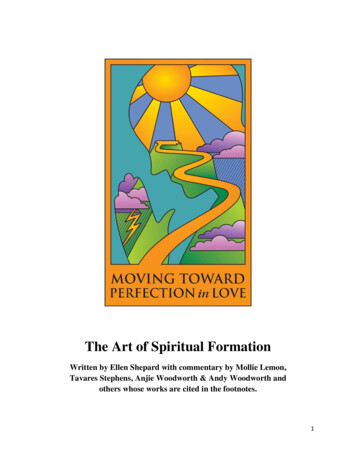
Transcription
The Art of Spiritual FormationWritten by Ellen Shepard with commentary by Mollie Lemon,Tavares Stephens, Anjie Woodworth & Andy Woodworth andothers whose works are cited in the footnotes.1
2
Table of ContentsHow I Fell in Love with God or The Art of Spiritual Formationp. 4Spiritual Types; An Understanding of How I Worshipp. 10The Art of Neighboringp. 15Care of the Earthp. 17The Art of Hospitalityp. 20The Examenp. 21Fastingp. 23Fixed Hour Prayerp. 26Lectio Divinap. 28Visio Divinap. 31Spoken Word Poetryp. 32The Labyrinthp. 34Other Disciplinesp. 39Resourcesp. 40Presentersp. 423
Spiritual Formation at Annual Conference 2018MusicStephen Curtis Chapman’s refrain Let Us PraySession IGreg Ellison/Ellen ShepardKnow Your Spiritual Type/Conversations with Country DarkSession IIAnjie and Andy WoodworthMy Life with Others NeighboringCare of the EarthHospitalitySession IIIOpening Myself to GodSession IVFormed by God’s WordExamen; FastingFixed Hour PrayerLahronda LittleJulie BooneLectio DivinaVisio DivinaMillie KimTavares StephensCelebration of DisciplinesSpoken Word PoetryTavares Stephens4
How I Fell in Love with God: Discovering Spiritual DisciplinesI think I have always been in love with the Mystery. Perhaps it was growing up on anisland, or spending my teenage years yearning for the next youth retreat, or discovering TheRetreat at Round Top that shaped 3 decades of my young adult life or Barbara Troxell’sseminary class on Prayer – in fact, it was probably all of these things that led me to a deephunger for God. When I purchased my first copy of Celebration of Discipline, I read it, markedit, taught it, loaned it and read it again. It was as if I have discovered gold!When I encountered Corrine Ware’s work on spiritual typing, I finally had words and anew understanding of why I was drawn to the mystery of God and to the theologicalunderpinnings of my faith. I knew why the words of hymns and creeds were important to me –but also why others in my life had no need of this, but rather needed color and movement andrhythmic music. I began to understand why some were impatient with religion that had no handsand feet. I had a fuller understanding of the word “church”.As newlyweds, Kelly and I spent a good bit of time looking for a church home in theyears prior to the appointive life. The building was important to me – not so much to him. Thehymns, the bulletin, the order and structure were important to me – he cared mostly about thescripture and sermon. And at the end of one of those services, when the choir recessed out twoby two to a Gregorian chant ending with a seven fold Amen, I knew I was home – and Kellywasn’t sure what had just happened. In Ware’s words, Type 1, 3 met with type 2,4.Ware encourages that we sit with these questions: What is my personal style ofspirituality? What is the best way for me to develop my spiritual life? Why is my expression ofspirituality different from that of others? I believe that the inventory she created and itsimplications for our spiritual life are hugely important. I hope you will take this inventory – foryourself – and for your worshipping community. I pray that you will explore the discipline ofLectio Divina, Holy Reading. It speaks to all spiritual types. But there are other disciplines thatalso enrich our life of faith. Many are included here.I am a seeker who seeks the Living Word. I seek God’s presence and guidance. I seektime alone and time with others on this journey. I have sought spiritual mothers, sisters andbrothers who have lead and nurtured me. I hope I might become a spiritual mother to a few. Idesire to live my life punctuated with moments of authenticity, beauty, connection, that lead meto love God and others in deeper ways.I invite you to sink into Mollie Lemon’s following commentary on our joint SpiritualFormation:5
Spiritual Formation 1Defining spiritual practices. It is helpful to first come to agreement on what we mean by spiritualpractices, also referred to as spiritual disciplines. Marjorie J. Thompson offers a helpful analogyin her book Soul Feast, comparing spiritual practices to garden tools. She writes that, “they[practices] keep the soil of our love clear of obstruction. They keep us open to the mysteriouswork of grace in our heart and our world. They enable us not only to receive but to respond toGod’s love, which in turn yields the fruits of the Spirit in our lives.” 2 Tilden Edwards writes thatspiritual disciplines are “ways of intentionally being present to God and reflecting on your ownexperience and awareness.” 3 Similarly, Henri Nouwen describes a spiritual discipline as “theconcentrated effort to create some inner and outer space in our lives, where this obedience [toGod] can be practiced. Through a spiritual discipline, we prevent the world from filling our livesto such an extent that there is no place left to listen.” 4 Thus, spiritual practices help us to stop, tobe present, to pay attention, to listen. The practices themselves can encompass many things, aswe will see, but they are all meant to help us create space for the work of the Holy Spirit.Why we need spiritual practices. Simply put by Henri Nouwen, “A spiritual life withoutdiscipline is impossible. Discipline is the other side of discipleship. The practice of disciplinemakes us more sensitive to the small, gentle voice of God and willing to respond when we hearit.” 5 We will often spend hours at the gym, or practicing a musical instrument, or in the pursuitof another passion at which we hope to improve, but many of us don’t devote the samededication to practicing our own spirituality. Dallas Willard compares spiritual disciplines toexercises practiced by star athletes. Like an athlete who hopes to perform well in the moment –in the game – we must discipline our minds and bodies if we expect to perform “at a moment ofcrisis.” While we are saved by grace, Willard writes that grace is the basis of God’s acceptanceof us, “but grace does not mean that sufficient strength and insight will be automatically“infused” into our being in the moment of need.” 6 In other words, “To live as Christ lived is tolive as he did all his life.” 7 While we aren’t saved by our own works, spiritual disciplines createan opening for the Holy Spirit to work in us. And as Edwards writes, “the power of the false self1This article was written by Mollie Lemon as a part of her final thesis for her Masters of Religion and PublicLeadership, Candler School of Theology at Emory University, and is used with her permission.2Thompson, Marjorie J., Soul Feast: An Invitation to the Christian Spiritual Life (Louisville: Westminster JohnKnox Press, 1995), 10.3Edwards, Tilden, Living in the Presence: Disciplines for the Spiritual Heart (San Francisco: Harper & Row, 1987),ix.4Nouwen, Henri J.M., Making All Things New: An Invitation to the Spiritual Life (San Francisco: Harper & Row,1981), 68.5Nouwen, 66.6Willard, Dallas, The Spirit of the Disciplines: Understanding How God Changes Lives (San Francisco: Harper &Row, 1988), 4.7Willard, 5.6
to reassert itself never finally disappears in this life,” and thus “we need personal and collectivespiritual disciplines that assist our vigilance and encourage our constant turning to God.” 8The role of the Holy Spirit. As we create space in our lives through spiritual disciplines, the HolySpirit is able to “conform us to the image of Christ” 9 and tutor us in relationship with God. 10 TheSpirit “is continuously challenging, changing, and maturing us” through spiritual practices, andhelping us to grow in “gratitude, trust, obedience, humility, compassion, service, and joy.” 11 Inhis classic Celebration of Discipline, Richard Foster writes that, “Inner righteousness is a giftfrom God to be graciously received. The needed change within us is God’s work, not ours. Thedemand is for an inside job, and only God can work from the inside.” 12 Nouwen agrees that anywork or transformation done within us is a result of the Holy Spirit, not of the practicesthemselves or our own strength or willpower. Of Pentecost, Nouwen writes, “When the HolySpirit descends upon the disciples and dwells with them, their lives are transformed into Christlike lives, lives shaped by the same love that exists between the Father and the Son. The spirituallife is indeed a life in which we are lifted up to become partakers of the divine life.” 13 In hisclassic sermon The Means of Grace, John Wesley emphasized the role of the Holy Spirit intransforming people, writing that “Ye are thus saved, not by any power, wisdom, or strength,which is in you, or in any other creature, but merely through the grace or power of the HolyGhost, which worketh all in all.” 14Spiritual practices are not ends in themselves. It should be emphasized that the practicesthemselves are not ends in and of themselves. Foster writes that, “By themselves the SpiritualDisciplines can do nothing; they can only get us to the place where something can bedone [They are] the means by which we place ourselves where [God] can bless us.” 15Thompson puts it succinctly, writing that spiritual practices “are simply means of grace.” 16 JohnWesley puts it a bit more starkly, writing that “all these means, when separate from the end, areless than nothing and vanity if they do not actually conduce to the knowledge and love of God,they are not acceptable in his sight.” 17 He goes on to say that “We allow, likewise, that all8Edwards, 6.Thompson, 6.10Thompson, 10.11Thompson, 7.12Foster, Richard J., Celebration of Discipline: The Path to Spiritual Growth. Revised Edition (San Francisco:HarperSanFrancisco, 1988), 6.13Nouwen, 54.14Wesley, John, Sermon 16, “The Means of Grace,” in The Sermons of John Wesley, ed. Thomas Jackson, GlobalMinistries of the United Methodist Church. Accessed April 12, 2018. y-Sermons/Sermon-16-The-Means-of-Grace15Foster, 7.16Thompson, 10.17Wesley, sermon.97
outward means whatever, if separate from the Spirit of God, cannot profit at all, cannot conduce,in any degree, either to the knowledge or love of God.” 18Our role and the role of willpower. Many of us may have been raised to believe that we canachieve anything we put our minds to. With willpower and determination, we are told that wecan realize our goals. Not so with the spiritual life. Thompson writes, “We cannot achievespiritual growth through sheer grit and willpower. The spiritual life is not a task of selfreformation. There is no fix-it-yourself kit, no manual promising ‘five easy steps to the completespiritual person’.” 19 This doesn’t mean we don’t have a role to play, however. We are called tocooperate with the work of the Holy Spirit within us by remaining open and receptive to theSpirit’s guidance. Spiritual practices help us to do this since, as Thompson writes, “experienceteaches that we don’t cooperate with God’s intentions for us easily.” 20 While God’s grace isunearned and not dependent on what we do or don’t do, “God has given us the Disciplines of thespiritual life as a means of receiving his grace. The Disciplines allow us to place ourselves beforeGod so that he can transform us.” 21 It would also seem that adopting spiritual practices requiresour patience. As Carter writes, “A practice itself, since it requires training, repetition, learning,and a span of time, is an argument against one of our culture’s fundamental premises: the desirefor immediate results.” 22Results of adopting spiritual practices. Eventually though, with the help of the Holy Spirit,results do manifest. A change or transformation in our inner person is apparent to us and toothers, and we sense an alignment of ourselves and our wills with God’s will. Through spiritualpractices, “the Spirit of God can recreate us as truly free people,” free of worry, anxiety, andbondage. 23 Thompson writes that, “As our own desires and intentions become aligned withGod’s intentions for us, we find ourselves free to follow and serve Christ. Discipline makes usdisciples with a clear and joyful purpose.” 24 We are free to enjoy “a life of relationship andintimacy with God” and are liberated “from stifling slavery to self-interest and fear.” 25 Willardbelieves the only way to true transformation of the inner person is through the practice ofspiritual disciplines in which “we can become like Christ in character and in power and thusrealize our highest ideals of well-being and well-doing.” 26 According to Edwards, throughspiritual disciplines we can come to a place of “contemplative awareness,” a state in which “we18Ibid.Thompson, 8.20Thompson, 8.21Foster, 7.22Carter, Jr., Kenneth H., A Way of Life in the World: Spiritual Practices for United Methodists (Nashville:Abingdon Press, 2004), 16.23Nouwen, 16.24Thompson, 11.25Foster, 2.26Willard, ix.198
fully embody our being in God, our deepest identity in God, the true self in the heart, our deepesthome and widest consciousness.” 27 In other words, God-consciousness.“The [one] who is wise, therefore, will see his life as more like a reservoirthan a canal. The canal simultaneously pours out what it receives; thereservoir retains the water till it is filled, then discharges the overflowwithout loss to itself . Today there are many in the Church who act likecanals, the reservoirs are far too rare . You too must learn to await thisfullness before pouring out your gifts, do not try to be more generousthan God.”― Bernard of Clairvaux, On the Song of Songs 1090-115327Edwards, 5.9
The Spirituality WheelA Spiritual Type Selector 28This inventory will help you DRAW A PICTURE of your personal style ofspirituality.Read through the following statements, circling the number corresponding to thestatement in each category that best describes your personal belief or preference.You may select as many statements as you wish; you need not only choose one.Match the chosen statement numbers with the quadrant numbers in the circle on thefollowing page. The largest numbers in a quadrant are an indication of your personal spiritualtype. If your numbers are similar in all quadrants, you can likely be happy worshippinganywhere.Please circle all that applyTHE ORDER OF WORSHIP1. A carefully planned and orderly worship program is a glory to God.2. A deeply moving and spontaneous meeting is a glory to God.3. Simplicity and some silence are important elements needed for worship.4. It is not a service, but ordering ourselves to God’s service that is important.TIME1. Stick to announced beginning and ending times of worship services.2. It is important to extend the meeting time if one feels led to do so.3. All time is God’s time. A sense of timelessness is important.4. Gather whenever and as long as you need to in order to accomplish the task.PRAYER1. Words express poetic praise; we ask for knowledge and guidance.2. Let words and feelings evoke God’s presence in this moment.3. Empty the mind of distractions and simply BE in the presence of the Holy.4. My life and my work are my prayer.MUSIC1. Music and lyrics express praise to God and belief about God.2. Singing warms and unites us and expresses the soul’s deepest heart.3. Chant and tone bring the soul to quietness and union with God.4. Songs can mobilize and inspire to greater effort and dedication.28Ware, Corrine,; Discover Your Spiritual Type, A Guide to Individual and Congregational Growth; Alban Institute,2000.10
PREACHING1. The Word of God, rightly proclaimed, is the centerpiece of worship.2. The gospel movingly preached is the power of God to change lives.3. Proclamation is heard when the Spirit of God speaks to the inward heart.4. What we do is our “preaching” and speaks louder than anything we say.EMPHASIS1. A central purpose is that we fulfill our vocation (calling) in the world.2. A central purpose is that we learn to walk in holiness with the Lord.3. A central purpose is that we be one with the creator.4. A central purpose is that we obey God’s will completely.SUPPORT OF CAUSES1. Support seminaries, publishing houses, scholarship, preaching to others.2. Support evangelism, missions, spreading the word on television and radio.3. Support places of retreat, spiritual direction, liturgical reform.4. Support political action to establish justice in society and its institutions.CRITICISM1. Sometimes we (I) are said to be too intellectual, dogmatic, and “dry.”2. Sometimes we (I) are said to be too emotional, dogmatic, and anti-intellectual.3. Sometimes we (I) are said to be escaping from the world and are not realistic.4. Sometimes we (I) are said to have tunnel vision and are too moralistic.DOMINATING THEMES1. Discernment, discipline, knowledge, order, grace, justification.2. Love, conversion, witness, spontaneity, sanctification.3. Poverty, humility, wisdom, letting go, transcendence.4. Simplicity, purity of heart, action, temperance, obedience, martyrdom.MEMBERSHIP CRITERIA(What you or a congregation believes is necessary)1. Assent to doctrine, baptism, and endorsement by group.2. A personal inward experience of God; Baptism; public declaration.3. All who face Godward are incorporated in the Holy.4. Solidarity with humankind is membership in God’s kingdom.RITUAL AND LITURGY1. Ritual and liturgy evoke memory and presence, teaching traditional truths.2. Liturgy and ritual ceremonies are not of great importance.3. Ritual and liturgy are ways in which God becomes present to us.4. Ritual and liturgy are one way we make statements about inner conviction11
CONCEPT OF GOD1. God is reveled in scripture, sacrament, and in Jesus Christ and his cross.2. I can feel that God is real and that Christ lives in my heart.3. God is mystery and can be grasped for but not completely known.4. We participate in the mystery of God when we become co-creators with God inthe world.(Count the number of selections for:1.2.3.4. )Worship is how we express our love,adoration, admiration, and wonder at God’spresence. The Christian breathes in God’sgoodness and exhales worship.For a lot of the church, worship has becomesynonymous with singing—but that’s just oneway that worship expresses itself. Trueworship happens when our entire lifebecomes a declaration of trust in God’sincredible mercy.Paul expressed this very idea when he said, “Iappeal to you therefore, brothers, by themercies of God, to present your bodies as aliving sacrifice, holy and acceptable to God,which is your spiritual worship.” (Rom. 12:1)12
Spiritual Type ExplainedType 1 (Head Spirituality) - Danger is Rationalism – Seminary professors, theologians,teachers This is an intellectual “thinking” spirituality that believes strongly in theknowability of God It favors the concrete (what it can see, touch and imagine) It tends to mistrust mystery and minimize emotions This style produces theological reflection and precision in thinking andcommunication People attracted to this form of spirituality tend to be rational and logical,valuing precision in their thinking and speech Content is of primary importance to these people Faith is belief in certain things Congruence of thought, and thought and action, are important Tend to look to the sermon and scriptures for spiritual guidance Tend to be people of the Word and people of words Prayer tends to be language or word-based Spiritual danger is rationalism – an over intellectualization of one’s spirituallife with a consequent loss of feeling and inner conviction Includes Disciple classes, Christian Believer.Type 2 (Heart Spirituality) – Danger is Emotionalism – Billy Graham, the image is Theceiling of the Sistine Chapel with the hand of God reaching for the hand of humankind. Here God is still understood to be knowable, but more through the heartthan the head If God is love, assumption is that he must be known through love, not simplyknown through ideas Spirituality is not, therefore, a head trip – it’s all heart Theology still important and Scriptures seen to be the source of our knowingof God But our response to knowing God is expected to involve heart, not just head Result is a more charismatic spirituality whose aim is to achieve holiness oflife Personal holiness is the goal of spirituality Prayer is made with words but words may be used less formally and prayeris often extemporaneous, spontaneous and even exuberant Of primary importance is experience Spiritual danger is excessive emotionalism and the belief that emotion is thetest of the validity of a person’s spiritual experience Another danger is an exclusive spirituality that results in an “us against theworld” mentality that fails to recognize the spiritual experience of those inother spiritual traditions Includes Walk to Emmaus, Mega Worship Events, Discipleship retreats, just for funretreats, mission trips that are evangelistic in nature, Financial Peace study 13
Type 3 (Mystical Spirituality) – Danger is Reclusivity. Might include: Julian of Norwich,Anthony de Mello, Thomas Merton, Teresa of Avila, Hildegard of Bingen. This is a mystical spirituality that emphasizes the mystery of faith and theultimate un-knowability of God Emphasizes that our thoughts about God are always imperfectreflections as God is “wholly other”, unnameable, beyond ourcomprehension and containment Emphasizes hearing from God over speaking to him Goal of spirituality is understood as union with God People attracted to this type of spirituality are often contemplative andintuitive, tending to be focused on an inner world that is as real to them asthe external one Renewal of the inner life is at the core of their understanding of spirituality Emphasize the process of spirituality (favorite metaphor of the journey) Spiritual danger is reclusivity – an exaggerated retreat from reality and frominteraction with the world, associated with passivity Included Labyrinth, Taize, spiritual retreats, Companions in Christ, Healing Service Type 4 (Social Justice Spirituality) – Danger is Moralism. Might include John Wesley,Jeremiah, Martin Luther King, Jr. Mystical experience is here coupled with an intellectual mode of gatheringdata Result is an active visionary who is single-minded with a deeply focused,almost crusading, type of spirituality People of this type often minimize importance (or value) of denominationalaffiliation (or even affiliation with organized religion) Goal is simply to obey God and in so doing, transform society bycontributing to the establishment of God’s Kingdom These people equate prayer and theology with action They have strong vision and ideals, but are not content to live with ideas –ideas always translate into action Spiritual danger lies in a moralistic and unrelenting tunnel-vision thatexcludes or judges others who do not share their passion Includes: Mission Building trips, building Habitat Houses, one-week studies, Supportgroups for children, youth or adults (in grief or transition), ESL Classes 14
Neighboring 29Genesis 1: 27God created humanity in God’s own image, in the divine image God created them Matt 22: 37-39He replied, “You must love the Lord your God with all your heart, with all your being, and with all yourmind. This is the first and greatest commandment. And the second is like it: You must love your neighboras you love yourself.Neighboring is opening yourself to speaking to people you don’t know to establish relationships withthose that live around you, work around you, or just happen to be physically or spiritually in the spacearound you. As you meet people and share conversations, learning names and a little about “the people inyour neighborhood” you can ask God: where is the divine spark in this one? What was in your heart whenyou called this person into being? Neighboring invites us to listen to the Spirit as we share time withneighbors on front porches or in driveway moments or in the checkout line, to listen for what gifts thisperson brings to the community. And as stories are shared and gifts are discovered, neighboring invites usto connect neighbors to each other – to introduce people with similar or complementary gifts or intereststo each other and release the outcome of this connection to the work of the Holy Spirit.An important word of caution: the practice of neighboring is a practice of opening your awareness to thepresence of beloved and unique creations of God all around you. This practice is not a trendy technique tofill your worship service up with new people next week– it is a slow work of listening and chatting andsharing stories and cups of sugar. Developing human relationships is an inherent good – and knowingmore of and about the people around you will open your heart up to what stories and hopes and worriesare at work in your community. The work of neighboring is not sales – the only thing you are looking foris to build relationships and pay attention to the Spirit. If the Spirit has ministry for you to do among theneighbors, you will be open to it, but your orientation must be to listen and to serve. Some tips for gettingstarted: Hold a little extra time in your schedule for stopping and talking with people you see out in yourneighborhood while you do whatever you usually do. Maybe it’s walking the dog or stopping tospeak to the neighbor who is always working in their yard. Don’t just hurry away, but ask an openended question or two and really listen to what they share.Learn your neighbors’ names and enough about them to know how to pray for them. Then prayfor them daily.Spend some time at the local gathering spot. Maybe it’s the Waffle House, the Bojangles, thecoffee shop, or the local ballfield. Just be present and chat with people. If you don’t know how tostart a conversation with someone new, you can always say “Hi. My name is and I’mnot sure we’ve had a chance to meet yet.”Anjie and Andy Woodworth. “based on the teaching of Matthew Johnson, Neighborhood Animator atSoCe Life”2915
Some resources to learn more: Check out neighboringmovement.org to learn more about the ministry and work of neighboringthat’s happening through SoCe Life in Wichita, KS. You can sign up for a weekly neighboring tipas well!Read The Art of Neighboring: Building Genuine Relationships Right Outside Your Door by JayPathak & Dave Runyon.Don’t ask what the world needs.Ask what makes you come alive,and go do it. Because what theworld needs is people who havecome alive.Community cannot for long feedon itself; it can only flourish withthe coming of others frombeyond, their unknown andundiscovered brothers.Howard Thurmond 1899-198116
Care of the EarthA relationship with God's creation and a ministry of caring for and healing the earth are integralto what it means to be a United Methodist.The following is an excerpt from the Social Principles: The Natural World:"All creation is the Lord’s, and we are responsible for the ways in which we use and abuse it.Water, air, soil, minerals, energy resources, plants, animal life, and space are to be valued andconserved because they are God’s creation and not solely because they are useful to humanbeings. God has granted us stewardship of creation. We should meet these stewardship dutiesthrough acts of loving care and respect." 30From The Book of Discipline: 31 Economic, political, social, and technological developmentshave increased our human numbers, and lengthened and enriched our lives. However, thesedevelopments have led to regional defoliation, dramatic extinction of species, massive humansuffering, overpopulation, and misuse and overconsumption of natural and nonrenewableresources, particularly by industrialized societies. This continued course of action jeopardizes thenatural heritage that God has entrusted to all generations. Therefore, let us recognize theresponsibility of the church and its members to place a high priority on changes in economic,political, social, and technological lifestyles to support a more ecologically equitable andsustainable world leading to a higher quality of life for all of God’s creation.Water, Air, Soil, Minerals, PlantsWe support and encourage social policies that serve to reduce and control the creation ofindustrial byproducts and waste; facilitate the safe processing and disposal of toxic and nuclearwaste and move toward the elimination of both; encourage reduction of municipal waste; providefor appropriate recycling and disposal of municipal waste; and assist the cleanup of polluted air,water, and soil. We call for the preservation of old-growth forests and other irreplaceable naturaltreasures, as well as preservation of endangered plant species. We support measures designed tomaintain and restore natural ecosystems. We support policies that develop alternatives tochemicals used for growing, processing, and preserving food, and we strongly urge adequateresearch into their effects upon God’s creation prior to utilization. We urge development ofinternational agreements concerning equitable utilization of the world’s resources for humanbenefit so long as the integrity of the earth is maintained. We are deeply concerned about theprivatization of water resources, the bottling of water to be sold as a commodity for profit, andthe resources that go into packaging bottled water. We urge all municipalities and othergovernmental organizations to develop processes for determining sustainability of water30From Social Principles: The Natural World in The Book of Discipline of The United Methodist Church. 2016 byThe United Methodist Publishing House.31From The Book of Discipline of The United Methodist Church - 2016. Copyright 2016 by The United MethodistPublishing House.17
resources and to determine the environmental, economic, and social consequences ofprivatization of water resources prior to the licensing and approval thereof.Energy Resources UtilizationThe whole earth is God’s good creation and as such has inherent value. We are aware that thecurrent utilization of energy resources threat
his classic Celebration of Discipline, Richard Foster writes that, “Inner righteousness is a gift from God to be graciously received. The needed change within us is God’s work, not ours. The demand is for an inside job, and onl

